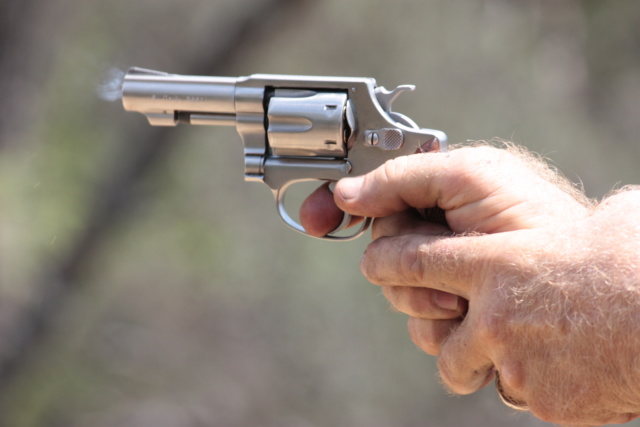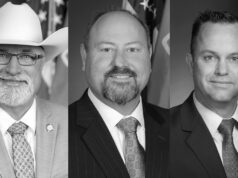Oklahoma Watch recently released its analysis of more than 2,200 bills and joint resolutions filed for the first session of Oklahoma’s 56th Legislature.
As one might expect, #oklaed issues like teacher pay, teachers’ pensions and school choice featured prominently among the vehicles filed. Likewise, measures designed to generate revenue in light of the state’s nearly $900 million revenue shortfall also drew lawmakers’ attention.
In addition to the filing of bills intended to address actual ongoing crises was the usual glut of extraneous, pandering and politically motivated bills designed to appease certain factions of an elected official’s constituency. Chief among them: Gun bills ostensibly intended to make access to and the carrying of firearms easier and less restricted.
Increasing access
Several bills for 2017 seek to increase access to firearms. For example, measures have been filed to increase access for active and veteran military personnel. One would eliminate handgun license-application and renewal fees (HB 1450), while another would allow active and veteran military personnel under the age of 21 to become eligible for a handgun license (HB 1428). Similarly, SB 35 would enable certain military personnel to carry (concealed or unconcealed) a handgun if they can present a valid military ID in lieu of a handgun license.
Civilians would also receive a break from firearm-licensing fees if SB 5 gains traction. This would reduce the license fee from $85 to $25 and reduce the first-time licensing fee from $100 to $25. The measure also increases license terms from one to five years. Josh Brecheen’s (R-Coalgate) SB 11 would also reduce firearms-related fees but goes further to:
- limit background checks to the Federal Bureau of Investigation’s National Instant Criminal Background Check System
- allow nonresidents to apply for an Oklahoma handgun license
- allows applications to be submitted online
Perhaps most sweeping of all, HB 2323, by Rep. Jeff Coody (R-Grandfield), would allow anyone over the age of 21 (except convicted felons) to carry a pistol in any manner (loaded, unloaded, open, concealed) and further prohibits law enforcement from disarming or physically restraining such people absent probable cause.
Easing restrictions on officials
At the same time that lawmakers filed bills to increase gun access, several bills seek to limit how those guns may be treated when in the possession of certain officials.
Perhaps all-too aware of the opposition facing a renewed fight with regard to a Ten Commandments monument, Rep. John Bennett (R-Sallisaw) has also filed a bill that would allow those entering security checkpoints at the state Capitol to carry weapons upon presentation of their valid handgun license. Further, Bennett’s HB 1935 would prohibit peace officers from removing, inspecting or restraining a person carrying a properly concealed firearm. Sen. Nathan Dahm (R-Broken Arrow) has a similar bill in SB 66.
Last, HB 1104 would amend the state’s existing unlawful carry laws to allow elected county officials with valid handgun licenses to pack heat inside their counties’ courthouses, and HB 1934 would allow Department of Corrections personnel to carry.
Gun bills offer wider berth
In addition to easier access and greater latitude into who may carry a gun and how, the locations of permissible gun presence is also being explored.
In general, two bills (SB 178 and SB 378) would increase protections for armed individuals on private property they legally control. Law enforcement would be barred from disarming or restraining such people unless they can produce “a reasonable and articulable suspicion of other criminal activity.”
More specifically, three gun bills targeting college campuses also seek to increase the rights of firearm owners. SB 380 would prohibit state and private colleges, universities and technical centers from creating rules that prohibit licensed owners to carry handguns on campus.
To piggyback on that proposition, HB 1556 would provide legal recourse for an individual denied such a right if that person subsequently becomes injured on campus during “a situation in which carrying a handgun would afford the person a means of self-defense.”
Last, SB 43 would remove the requirement that those with written permission to carry on a campus report as much to the Oklahoma State Bureau of Investigation.
Ready, aim … fire?
In keeping with the theme of increasing firepower throughout the state, House Speaker Pro Tempore Harold Wright (R-Weatherford) has filed a bill that would potentially bring those convicted of the death penalty in Oklahoma in front of a firing squad.
HB 1679 would create a hierarchy of methods for executing people, as follows:
- Lethal Injection
- Nitrogen Hypoxia
- Firing Squad
- All other forms not prohibited by the U.S. Constitution
“This bill has little to do with the administration of the death penalty and more to do with the efficiency of government and our commitment to due process for both the inmate and the victim’s family,” stated Wright in a press release Thursday.
With so many guns potentially floating around the state’s campuses, Capitol and county courthouses, there should be no shortage of viable means to fulfill option three.
But if you’re really looking for efficiency, why not bring back the guillotine? After all, if Wright’s bill miraculously passes, there’s no guarantee the state will be able to afford bullets.





















